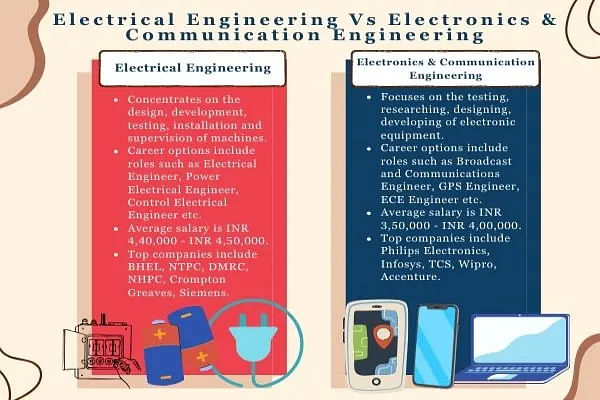In Electrical Engineering vs Electronics Communication Engineering, EE is a specialization of engineering that deals with the study, design & application of equipment, devices & systems. At the same time, ECE is a specialized engineering stream that deals with communication equipment.
The difference between electrical engineering vs communication engineering is that electrical engineering has a vaster scope for career in comparison to electronics and communication engineering.
Electronics and communications engineering has a limited scope compared to electrical engineering because it focuses mostly on optimization, management, and design only.
Electrical engineering students work on a range of components like tiny chips to big system generators. In contrast, Electronic and communication engineering students work with transmitter, receiver, integrated circuits (IC) etc.
What is Electrical Engineering?
Electrical engineering specialization is concerned with the study, design, and use of devices and equipment. Therefore, it also contains electromagnetism. It is a branch of engineering that extends over a wide range of subtypes that contain telecommunication, computer engineering, electronics, photonics, etc.
What is Electronics Communication Engineering?
Electronics and communication engineering (ECE) incorporates communication engineering & the core of electrical engineering. It also works with microprocessors, solid-state machines, satellite transmission tools, circuits and electronic appliances.
Also Check: 10+ Highest Paying Engineering Jobs in 2023
Differences Between Electrical Engineering vs Electronics and Communication Engineering
In between Electrical Engineering vs Electronics and Communication Engineering, there are certain insights that students may require for better understanding.

Below given are the Electrical Engineering vs Electronics and Communication Engineering highlights.
|
Parameters |
Electrical Engineering |
Electronics Communication Engineering |
|
Prime Focus |
Design, Develop, Test, Installation and Supervise Machines |
Testing, Researching, Designing, Developing of Electronic Equipment |
|
Crucial Elements |
Electromagnetic fields, electric power, transformers, magnetic materials. Operational amplifiers etc. |
Transmitters, communication channels, receivers, etc. |
|
Job Profile |
Electrical Engineer Power Electrical Engineer Control Electrical Engineer |
Broadcast and Communications Engineer GPS engineer ECE Engineering |
|
Average Salary |
INR 4,40,000 |
INR 3,50,000 |
|
Top Recruiters |
BHEL, NTPC, DMRC, NHPC, Crompton greaves, Siemens, Hitachi, Jindal steel and power, reliance, I&T, TATA and Samsung engineering, Power Grid. |
BEL, DRMC, Siemens, Texas instruments, Intel, NVidia, Philips Electronics, Infosys, TCS, Wipro, Accenture, HCL Technologies and Tech Mahindra, EXL, Motorola, Samsung and Flextronics |
Also Check: Aeronautical Engineering vs Aerospace Engineering - Which Has a Better Scope?
Top Colleges for Electrical Engineering
Candidates who wish to purse a course in Electrical Engineering can choose amoongst the top colleges in India for Electrical Engineering that have been listed below:
- IIT Madras
- IIT Delhi
- IIT Bombay
- IIT Kanpur
- IIT Roorkee
- IIT Kharagpur
- IIT Hyderabad
- Jadavpur University, Kolkata
- VIT Vellore
- IIT Indore
Also Check: Top Engineering Electrical Engineering Colleges
Top Colleges for Electronics and Communication Engineering
The top colleges in India for Electronics and Communication Engineering mentioned below for the reference of students interested to study the subject:
- NIT Trichy
- IIT Guwahati
- NIT Surathkal
- NIT Rourkela
- IIT Madras
- IIT Delhi
- IIT Roorkee
- IIT Kharagpur
- IIT Hyderabad
- VIT Vellore
Also Check: Top BTech Electronics Communication Engineering Colleges
Skills Required for Electrical Engineering vs Electronics and Communication Engineering
Engineers' skills in demand depend on the area of specialization they are working in. Listed below are the top three skills with a strong impact on earning potential or high popularity in Electrical Engineering vs Electronics Communication Engineering.
|
Electrical Engineering Skills |
Electronics Communication Engineering Skills |
|
Project Management |
Project Management |
|
Engineering Design |
Engineering Design |
|
Electronic Troubleshooting |
Programmable Logic Controllers |
|
Test Engineering |
Autodesk AutoCAD |
|
C, C++ and HDL Programming Languages |
MATLAB |
Also Check: 100+ Electrical Engineering Seminar Topics for Students
Job Scope for Electrical Engineering vs Electronics and Communication Engineering
Electronics engineers create and customize components for electrical devices & systems in various industries. Additionally to designing components for consumer hardware, they may also work on government, healthcare, and military projects.
Below are some of the industries electronics engineers work:
- Telecommunications
- Semiconductor & various electronic component manufacturing
- The federal government
- Engineering services
- Navigational, measuring, electromedical & control instruments manufacturing
Electronics communication engineers work on projects in areas varying from 5G networks to climate adaptation & power preservation. They may design power distribution and storage networks for renewable energy or design better control systems for other critical infrastructure.
Below are some of the industries in which electronics communication engineers work:
- Engineering services
- Electric power generation, transmission and distribution
- Navigational, measuring, electromedical & control instruments manufacturing
- Research and development in the physical, engineering & life sciences
- Semiconductor & other electronic component manufacturing










